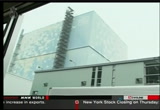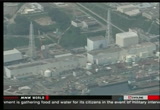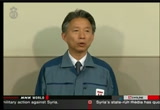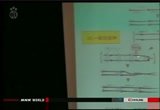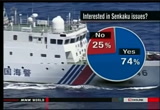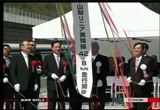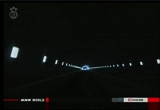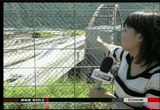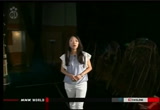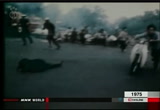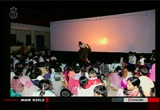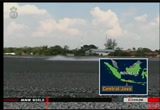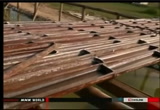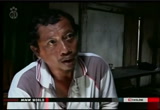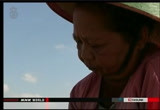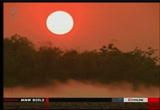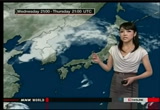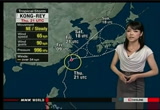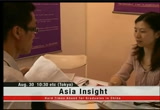tv Newsline PBS August 29, 2013 5:30pm-6:01pm PDT
5:30 pm
hello there. welcome to "newsline." it's friday, august 30th. i'm catherine kobayashi in tokyo. residents of syria are shuttering themselves inside their homes. they're stocking up on food and water. they're waiting to find out whether u.s. forces and their allies will attack their country. western leaders believe last week syrian troops attacked civilians in the suburbs of damascus with chemical weapons.
5:31 pm
opposition activists say hundreds of people were killed. u.s. president barack obama and other leaders believe such action can't go unpunished. state-run tv quoted president bashar al assad as saying syria will defend itself against any aggression. he said an assault will only strengthen national unity. prime minister called a meeting of cabinet ministers. he said authorities need to prevent their enemies from disrupting state services such as electricity, drinking water, communications, food and oil. many residents are trying to flee into neighboring lebanon. those who have chosen to stay are doing whatever they can to prepare for a siege. the possibility of an attack from abroad has not stopped the fight inside syria. opposition activists at least 43 people were killed in the latest battles. a syrian opposition leader says western forces need to act quickly to prevent any more chemical attacks.
5:32 pm
khaled saleh serves as a spokesperson for the syrian national coalition. he says the more time it takes to make a decision, the more civilian lives will be lost. >> at first we have to stop assad from committing additional crimes against civilians. those who were responsible for committing these crimes must be brought to justice. >> but he said that military action should be limited to depriving the assad regime of the ability to mount chemical attackses. opposition forces should overthrow the government without western intervention. british prime minister david cameron has been trying to convince lawmakers of the need to strike syria, but most members don't agree. members of cameron's coalition government would have authorized a but majority of lawmakers voted against it. it's clear parliament doesn't want any military intervention and the government will act accordingly.
quote
5:33 pm
workers at japan's fukushima daiichi nuclear plant have been struggling to control the flow of radioactive water. japan's industry ministry plans to take aggressive measures next month to address the growing problem. workers last month found that highly radioactive water was flowing with ground water into the sea. they also recently discovered that
5:34 pm
restart a filtering system to remove radioactive substances from toxic water. it says it will carry out a trial run of this system as early as mid-september. the system previously experienced problems. the expert panel will consider expanding the use of such treatment equipment to reduce the amount of contaminated water. more than 300,000 tons of tainted water is stored in tanks
5:35 pm
say they want utility workers to scrap all ten reactors. they say there's no alternative, because residents have been forced to live as evacuees since the meltdown. the leaders plan to get assembly members to endorse their demand, then will take that demand to central government officials and utility representatives. >> translator: we will strive not only to get the reactors scrubbed, but also to help end the crisis at the fukushima daiichi plant. >> fukushima prefectural governor yuhei sato have called for all ten reactors to be scrapped. the chief of the headquarters says he wants to discuss the issue with townspeople but he says company officials can't reach a decision right now because they need to consider local views and the anyways's energy policy. people in fukushima prefecture have been closely monitoring radiation levels since the nuclear disaster.
5:36 pm
they're now able to access this information when they travel on public transport. buses in four cities began using special equipment on thursday to measure radioactivity from the nuclear accident. researchers from the japan atomic energy agency developed this system. the realtime measurements are posted at the station and available online. the data is updated every 30 seconds. areas with low radiation levels are shown in blue. the color changes to green, then yellow as levels rise. the data can be tracked back to january. i's very useful to have realtime information about radiation levels because they change when we have windy or rainy weather. japanese scientists may have discovered the secret of youth.
5:37 pm
they found that manipulating certain genes can regulate aging and lifespan. a research team led by professor takafumi made the discovery using yeast. the group focused on a structure in cells call a ribosome. the team found that when yeast ages the cells have ribosome that function in an unstable manner. they then manipulated the genes to function in a stable fashion. even as the yeast ages. the yeast lived three day, one day longer than usual. >> translator: the discovery could eventually enable people to extend their lives. i hope this can develop medicine to be healthy and live longer. >> kobayashi says his team has solved one of the mechanisms of aging and hopes to make further study on the findings. a recent survey indicates
5:38 pm
that japanese people are aware of issues surrounding the senkaku islands in the east china sea. japan controls the islands. china and taiwan claim them. the nationwide survey in mid-july examined public awareness of the issues. of 3,000 randomly selected people, about 1800 responded. more than 90% said they know about the issues. of those who know the issues, 75% said they know chinese government ships have repeatedly entered japanese waters near the islands. 75% said japan has been launching protests with china. 66% said the islands belong to okinawa prefecture in southern japan. 48% said they know japan controls the islands and that no issue of territorial sovereignty exists. and 74% said they're interested in the senkaku issues. 25% said they're not. cabinet secretary and officials say they'll step up efforts to
5:39 pm
heighten public aware ochbs the issues. u.s. ambassador to japan nominee caroline kennedy has publicly shown affinity for the country. she'll be coming to the country this fall pending senate confirmation. kennedy spoke in washington at a ceremony marking the 50th anniversary of martin luther king jr.'s i have a dream speech and cited what she called an old japanese proverb. the water flows on, but the river remains. encouraging people to work together for a better world. >> now it's our turn to live up to our parents' dream, to draw renewed strength from what happened here 50 years ago >> her father, john f. kennedy, was u.s. president when king delivered the speech, calling . for an end to racial discrimination. japan's railway engineers have a long track record in developing high speed trains. shinkansen trains first started
5:40 pm
crisscrossing the country 50 years ago. the fastest bullet train in service reaches speeds of 300 kilometers per hour. engineers are now conducting test runs of a new train. the l-0 can travel at 500 kilometers per hour. nhk world reports. >> reporter: the l-0 uses a technology developed in japan to race over long distances at superfast speeds. it's called superconducting magnetic levitation. officials have just opened a new track for test runs in central japan. it's nearly 43 kilometers long. ♪
5:41 pm
commercial service isn't scheduled to begin until 2027. once the train is up and running, it will take people from tokyo to nagoya in just 40 minutes, one hour less than a bullet train trip. >> translator: i was impressed by the speed, and its quietness surprised me. >> translator: the train will make it much easier to get around. i'm excited. >> translator: the l-0 will drastically change japan's economy and society. this technology will help propel japan ahead in the world. >> reporter: engineers first began working on the train nearly half a century ago. they've kept at it ever since. in 2003, a prototype reached 581 kilometers per hour, a record that still stands.
5:42 pm
special magnets hold the key to the train's speed. the l-0 has superconducting electro magnets along the outside. they make it possible for the train to levitate and raise along the track without losing altitude or speed. for this to happen, it's necessary to eliminate the magnet's electrical resistance. the train is equipped with an internal cooling system and it reduces the magnet's temperature to minus 269 degrees celsius and results in zero resistance. japan's railway technologies are among the most advanced in the world. railroad executives and government officials hope to take japan's expertise abroad. by take this maglev train to north america and other countries. developers face several hurdles to making the japanese train a
5:43 pm
global success. for one, engineers in countries such as germany and france are working on high speed trains of their own. the l-0's creators will keep racing to stay ahead of the curve. reporting for nhk world, yamanashi. japan's largest annual puppet festival took place in nagano prefecture early this month. one guest troupe from cambodia produced a traditional shadow puppet play. not long ago this style of story telling which dates back over 1,000 years, was on the brink of extinction. a japanese woman has been involved in preserving this history of culture. we have more. ♪
5:44 pm
>> reporter: artists from cambodia bring to life the ancient epic of prince rama and his quest to rescue his wife from the demon king ravana. their style of puppetry is ca called sbektone which means body leather. the puppeteers are an important part of this ancient shadow theater. the puppets are all hand made from a single piece of cow hide. it was recognized as a unesco cultural heritage in 2005. >> translator: it was beautiful. >> translator: it was fun to see this unusual shadow theater. >> reporter: not too long ago, cambodia's traditional shadow puppet theater was on the verge of disappearing, but thanks to the efforts of one japanese woman, the ancient art form has a better chance of being passed
5:45 pm
down to future generations. this is the first foreign female member of the troupe. she's been organizing work shops and performances of it both in cambodia and japan for almost two decades. >> translator: i'm drawn to the shadow puppet theater, but i am even more captivated by the people who are doing it. >> reporter: she met the late puppet master when she was an interpreter for the troupe 17 years ago. he was one of the few surviving artists when the art form was revived in the 1990s. he was invited by the government to teach a younger generation how to perform the shadow plays. traditional cambodian kl tur was almost lost under the repression of the khmer rouge regime of the
5:46 pm
late 1970s. more than 90% of the country's artists are said to have been killed during that time. at the age of 80, he became worried that the art might not survive. he had been teaching from memory without any written scripts. so he decided to let her put the narrations on paper for the first time. >> translator: after i spent more than one year with him, i think he realized how much i really love shadow puppetry. so he trusted me. >> reporter: since then, she has been working in every way she can to support the troupe. with the help of japanese organizations, a new training facility has just been built in cambodia. puppetry workshops are also being held at schools. with more chances to see and learn, children are beginning to show more interest. through workshops and performances like this one in
5:47 pm
japan, more people are now getting a chance to experience this classical cambodian art form. >> we can't speak other languages and we have no way to gather people for our performances. she's been helping us little by little for some time now, and so more and more people are learning about us. >> translator: the more chances they have to perform, the stronger their motivation will be and the better their performance will become. i think they need to have more chances to perform. that is the most important thing. >> reporter: she hopes people in cambodia will treasure their own traditions. she says she will continue to paurt the troupe and work to let more people around the world know about its rich living heritage. reporting for nhk world.
5:48 pm
on the indonesian island of java, mud geysers have provided local people with a source of income for hundreds of years. the geysers are subterranean source of salt which locals harvest and sell for cooking, but as nhk world reports, the future of this tradition is far from clear. >> reporter: a plume of muddy water vapor up to ten meters high shoots up from the ground. it's a phenomenon known as a mud volcano. this mud area is three kilometers around, it's about 100 kilometers inland from the
5:49 pm
javonese coast. but about 5 million years ago it was on the sea bed. the land has risen but sea water remains trapped deep underground. pressure from geological movements forces geysers along this mixture of ancient sea water and mud up to the surface. for hundreds of years, it has also provided local people with a source of salt. this man has been harvesting salt here for 71 years. he started when he was just 12 years old. the first step is to bring muddy water to the channel. muddy water drawn along the channel is collected in bamboo
5:50 pm
containers and left for five days under the sun. the finishing touch, water containing a higher concentration of salt is sprinkled on the top to make the grains bigger in size and slightly sweet in taste. >> translator: it tastes good, very fine salt. everything will be ready by tomorrow. >> reporter: the collected salt is an ingredient in local kitchens. it's used to prepare indonesian dishes. >> translator: without this salt, it just wouldn't taste right. everyone in our village uses the salt.
5:51 pm
>> reporter: the salt is under threat from cheaper, mass-produced brands. only three people still harvest salt here down from a peak of more than 100. and few young people are willing to take on this grueling work. daytime temperatures soar to more than 35 degrees celsius, and the small amount generates an income of only about $150, not enough to make and meet. she is 60 years old. her husband was a salt farmer. he passed away last year. both her sons have other jobs. she carries on her late husband's work, but her
5:52 pm
customers' enthusiasm kept her going. her fine tasting salt has a good reputation spread by word of mouth. people travel from far and wide to purchase it. >> translator: my customers tell me my salt is the real deal. i'm determined to preserve this traditi tradition. >> reporter: for the salt farmers of central java, these grains are more than just a source of income. they're the bounty of nature from the deep underground for more than 5 million years. reporting for nhk world, java, indonesia.
5:53 pm
now, let's take a look at the market figures. it's time now for a check on the weather with meteorologist sayaka mori. good morning. people in tokyo are commuting to work or school under sunny skies, but it seems residents in northern japan are seeing a different picture. >> that's right, catherine. heavy rain is coming down from northern japan into south korea due to a frontal system and this is about the zone where the relatively cool air, autumnal air is meeting up with hot
5:54 pm
summer heat across the south. tok tokyo's high could be 36. oppressively hot conditions today. again heavy rain anywhere across the frontal system. expected amount of heavy rain is looking like this. 100 millimeters or more for the corner of south korea and the sea of japan side of japan with the heaviest rainfall over 200 millimeters in nagasaki prefecture. it looks like the frontal system will intensify even further as we go into the weekend thanks to an incoming tropical storm that's expected to feed ample moisture to the front. the latest information on the tropical storm is that currently winds are as strong as 65 kilometers per hour near the center of the storm with gusts of 90 miles per hour. it's a minimal tropical storm but because of the slow movement it has dropped tremendous amounts of rain for taiwan. we have a course of 800 millimeters of rain over the past three days. very heavy rain.
5:55 pm
many schools were canceled and flights canceled as well yesterday. it is approaching mainland china, then curve towards the northeast aiming for mainland japan. the center could reach western japan between saturday night into sunday morning local time as a tropical storm. now, the expected rainfall is about 200 millimeters, 250 millimeters and then lots of heavy rain for mainland japan as we go into the weekend. flooding rivers, mud slides will be at risk for the next several days. across north america there are two spots of severe weather, one over the great lakes region and the other is over the west coast of the pacific northwest and parts of british columbia. but a heat dome is blanketing much of the midsection of the u.s. that is resulting in high
5:56 pm
temperatures. 36 degrees for you in denver. 36 for you as well in oklahoma city and amazingly 43 in dallas on friday. the heat is expected to affect the western portions of the u.s. 32 for you in los angeles. finally in europe, an upper cold has caused severe floods. take a look at the situation. storms and rain have concentrated in the east and south of spain. 70 millimeters of rain fell in valencia where water rose to people's ankles. there were strong gusts of 78 kilometers per hour. unfortunately, the situation will remain unsettled across this area. more rain is likely mainly during the midpart of the day. scattered thundershowers also across the black sea region and wet and windy conditions will approach the northern areas of the uk starting friday
5:57 pm
5:58 pm
6:00 pm
>> good afternoon. i'm james harmon, president and ceo ceo of the wilson center. it has occurred to our speaker and me and maybe some of you that today is the second anniversary of zero dark 30. it was on may 2 at 12 :00 a.m. that the takedown of osama bin laden occurred. someone with my left had a lot to do with that. more on that later. a special welcome to the ambassad o
121 Views
IN COLLECTIONS
KCSM (PBS) Television Archive
Television Archive  Television Archive News Search Service
Television Archive News Search Service 
Uploaded by TV Archive on

 Live Music Archive
Live Music Archive Librivox Free Audio
Librivox Free Audio Metropolitan Museum
Metropolitan Museum Cleveland Museum of Art
Cleveland Museum of Art Internet Arcade
Internet Arcade Console Living Room
Console Living Room Books to Borrow
Books to Borrow Open Library
Open Library TV News
TV News Understanding 9/11
Understanding 9/11



